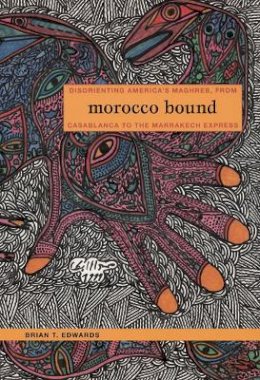Brian T. Edwards is Assistant Professor of English and Comparative Literary Studies at Northwestern University.
“Morocco Bound is a powerful meditation on the question of why the circulation of cultural representations matters…. Given its important critical interventions, Morocco Bound should be a required text for a broad range of readers and scholars in the fields of American studies, postcolonialism, comparative literature, and Middle Eastern Studies.” - Ali Behdad, Comparative Literature "Throughout this book it is clear that Edwards views dialogue as a modest corrective to Orientalist tendencies, often pointing out moments when opportunities for exchange were missed. Edwards’s own work is consciously collaborative and dialogic; he acknowledges his debt to Moroccan colleagues. His own experiences in Morocco, the ground on which this book is built, constitutes yet another chapter in the American-Moroccan encounter at an historical moment when the need for dialogue and conversation across the gaping chasm separating the United States and the Arab world is as dire as ever." - Allen Hibbard, Comparative Literature Studies "Not only does Edwards’s book propose a methodology that importantly indicates the material differences between text and context, but it also breaks new scholarly ground in presenting a new area of study for transnational American studies: the orientalist construction of the Maghreb. In doing so, Morocco Bound represents a timely intervention into the epistemological and material violence of the present moment and promises to be a study that will be returned to long after the present conflict (hopefully) has passed." - Christopher Breu, Comparative Studies of South Asia, Africa, and the Middle East "Morocco Bound is an exemplary work of postcolonial American studies scholarship, one acutely sensitive to the importance of the specificities of colonial and imperial relations in the Maghreb. Yet Morocco Bound is no predictable ideological study. Edwards constantly foregrounds the historical complexities of encounter in each text he analyzes while simultaneously presenting nuanced close readings. In the process, he challenges familiar theoretical paradigms and presents us with new possibilities." - Malini Johar Schueller, American Quarterly “Morocco Bound announces a radical departure from contemporary debates on orientalism through an interesting deployment of the concept of circulation in its study of the U.S. encounter with North Africa and through an astute consideration of the ways that American texts translate the North African Arab and Berber other. With this book, postcolonialism, cultural studies, African studies, and American studies will be refreshed and can begin some of the most exciting debates anew.”-Taieb Belghazi, Mohammed V University, Rabat, Morocco “By his commitment to working across languages, treating several disciplines and diverse cultural levels (official, mass, avant-garde), and by his disruptive practice of reading Arabic voices together with Anglophones, Brian Edwards has produced an exemplary performance of what American Studies must become in the twenty-first century.”-Jonathan Arac, author of The Emergence of American Literary Narrative, 1820–1860 "As literary studies in the United States founder between America globalizing and the globe Americanizing, Brian T. Edwards's brilliant analysis of how America becomes worldly for others is a model for future work. Here language-based close readings bring literary criticism and the study of cultural politics together as the author guides us with a sure hand from cold war ideology, through 'hippie orientalism' and postcoloniality, onto the threshold of the consequences of globalization seen in a new perspective."-Gayatri Chakravorty Spivak “Morocco Bound is a fascinating and insightful account of the multiple ways that Americans engaged Morocco from the 1940s to the 1970s. . . . [A] sophisticated and fascinating work of first-class scholarship that will be of great interest to scholars and students of history, cultural and literary studies, and area studies.” - Melani McAlister (Journal of American History) "Morocco Bound offers a compelling account both of the Maghreb as an important contact zone in the formation of the United States as a global power and of American orientalism as a formative component in American foreign relations. . . . [T]he power here lies in detailed cultural historiography, and some of the text’s most compelling moments reside in the connective tissue of Edwards’s historicist argumentation." - Margaux Cowden (GLQ) “Morocco Bound is a powerful meditation on the question of why the circulation of cultural representations matters…. Given its important critical interventions, Morocco Bound should be a required text for a broad range of readers and scholars in the fields of American studies, postcolonialism, comparative literature, and Middle Eastern Studies.” - Ali Behdad (Comparative Literature) "Morocco Bound is an exemplary work of postcolonial American studies scholarship, one acutely sensitive to the importance of the specificities of colonial and imperial relations in the Maghreb. Yet Morocco Bound is no predictable ideological study. Edwards constantly foregrounds the historical complexities of encounter in each text he analyzes while simultaneously presenting nuanced close readings. In the process, he challenges familiar theoretical paradigms and presents us with new possibilities." - Malini Johar Schueller (American Quarterly) "Not only does Edwards’s book propose a methodology that importantly indicates the material differences between text and context, but it also breaks new scholarly ground in presenting a new area of study for transnational American studies: the orientalist construction of the Maghreb. In doing so, Morocco Bound represents a timely intervention into the epistemological and material violence of the present moment and promises to be a study that will be returned to long after the present conflict (hopefully) has passed." - Christopher Breu (Comparative Studies of South Asia, Africa and the Middle East) "Throughout this book it is clear that Edwards views dialogue as a modest corrective to Orientalist tendencies, often pointing out moments when opportunities for exchange were missed. Edwards’s own work is consciously collaborative and dialogic; he acknowledges his debt to Moroccan colleagues. His own experiences in Morocco, the ground on which this book is built, constitutes yet another chapter in the American-Moroccan encounter at an historical moment when the need for dialogue and conversation across the gaping chasm separating the United States and the Arab world is as dire as ever." - Allen Hibbard (Comparative Literature Studies)

